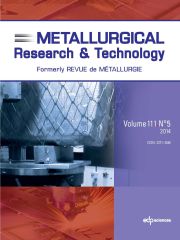Crossref Citations
This article has been cited by the following publications. This list is generated based on data provided by
Crossref.
Wang, Qi
Guo, Rui
Zhao, Xue-fei
Sun, Jia-fu
Zhang, Song
and
Liu, Wen-zhuang
2016.
A new testing and evaluating method of cokes with greatly varied CRI and CSR.
Fuel,
Vol. 182,
Issue. ,
p.
879.
Guo, Rui
Duan, Chong
Sun, Zhang
Wang, Jie-ping
Sun, Xiao-wei
and
Liang, Ying-hua
2017.
Effect of pore structure and matrix reactivity on coke reactivity and post-reaction strength.
Metallurgical Research & Technology,
Vol. 114,
Issue. 5,
p.
504.
Chai, Yi-fan
Luo, Guo-ping
An, Sheng-li
Peng, Jun
and
Wang, Yi-ci
2019.
Influence of unburned pulverized coal on gasification reaction of coke in blast furnace.
High Temperature Materials and Processes,
Vol. 38,
Issue. 2019,
p.
733.
Yu, Dongsheng
Guo, Rui
Liang, Yinghua
Liu, Lianji
and
Chen, Peng
2019.
Effects of alkali metal on solution loss and coke degradation.
Metallurgical Research & Technology,
Vol. 116,
Issue. 6,
p.
609.
Geng, Yaheng
Guo, Rui
Li, Yizhuo
Zhang, Xin
and
Lin, Jiaxiong
2020.
Characteristics of coke pore formation and its effect on solution loss degradation.
Metallurgical Research & Technology,
Vol. 117,
Issue. 1,
p.
112.
Huang, Junchen
Guo, Rui
Wang, Qi
Liu, Zhongsuo
Zhang, Song
and
Sun, Jiafu
2020.
Coke solution-loss degradation model with non-equimolar diffusion and changing local pore structure.
Fuel,
Vol. 263,
Issue. ,
p.
116694.
Huang, Junchen
Tao, Lin
Tie, Weibo
Li, Zhexi
Wang, Qi
and
Liu, Zhongsuo
2020.
Transport Properties of CO2 in Different Reactivity Coke Solution Loss Reaction Based on Stefan Flow Theory.
ACS Omega,
Vol. 5,
Issue. 41,
p.
26817.
Huang, Junchen
Guo, Rui
Tao, Lin
Wang, Qi
Liu, Zhongsuo
Zhang, Song
and
Sun, Jiafu
2020.
Mass transfer coefficient and effective internal diffusion coefficient for coke solution loss reaction with non-equimolar diffusion.
Fuel,
Vol. 278,
Issue. ,
p.
118225.
Cheng, Huan
Liang, Yinghua
Guo, Rui
Sun, Zhang
Wang, Qi
Xie, Quan'an
and
Wang, Jieping
2021.
Effects of solution loss degree, reaction temperature, and high temperature heating on the thermal properties of metallurgical cokes.
Fuel,
Vol. 283,
Issue. ,
p.
118936.
Zhang, Jun
Yu, Dongsheng
Guo, Rui
and
Lin, Jiaxiong
2021.
Degradation behaviors of coke under complex solution loss conditions.
Metallurgical Research & Technology,
Vol. 118,
Issue. 1,
p.
101.
Jin, Jin
Wang, Qi
and
Zhang, Song
2021.
Kinetics and mechanisms of coke and sinter on the coupling reaction to evaluate the integrated effects of coke solution loss reaction on blast furnace processes.
Metallurgical Research & Technology,
Vol. 118,
Issue. 5,
p.
506.
Lan, Chen-chen
Zhang, Shu-hui
Liu, Xiao-jie
Liu, Ran
and
Lyu, Qing
2021.
Kinetic Behaviors of Coke Gasification with CO<sub>2</sub> and H<sub>2</sub>O.
ISIJ International,
Vol. 61,
Issue. 1,
p.
167.
Zhang, Jun
Lin, Jiaxiong
Guo, Rui
and
Hou, Caixia
2022.
Effects of microscopic characteristics on post-reaction strength of coke.
International Journal of Coal Preparation and Utilization,
Vol. 42,
Issue. 6,
p.
1615.
Wei, Qingwen
Pang, Keliang
Liang, Cai
Wang, Minghao
Wang, Qiuyue
and
Wang, Yaning
2023.
The fracture characteristics and enhancement mechanism of crushing strength for the coke with hot pressing.
Journal of Analytical and Applied Pyrolysis,
Vol. 171,
Issue. ,
p.
105981.
Hao, Liangyuan
Zhang, Jianliang
Cheng, Huan
Xiao, Luying
Liao, Fei
and
Hu, Wenjia
2024.
Study on the Influence of Industrial Coke Oven Size on the Quality of Metallurgical Coke.
Processes,
Vol. 12,
Issue. 8,
p.
1637.
Zhou, Feng
Peng, Daosheng
Li, Kejiang
Conejo, Alberto N.
Liao, Haotian
Xiong, Zixin
Li, Dongtao
and
Zhang, Jianliang
2024.
Coke behavior with H2O in a hydrogen-enriched blast furnace: A review.
International Journal of Minerals, Metallurgy and Materials,
Vol. 31,
Issue. 5,
p.
959.
Ma, Xingye
Wang, Gang
Li, Chao
Sui, Yuesi
Liu, Yang
Zhong, Xiangyun
Xu, Guozhong
Wu, Shiyong
and
Bai, Jinfeng
2024.
The solution-loss reaction of cokes with different reactivity and lump ores during reductive coupling.
Energy Sources, Part A: Recovery, Utilization, and Environmental Effects,
Vol. 46,
Issue. 1,
p.
9062.
Gui, Yifan
Li, Qiang
Niu, Wenquan
Yuan, Xin
Wang, Jingsong
Wang, Guang
Zuo, Haibin
She, Xuefeng
and
Xue, Qingguo
2025.
Research Progress on Coke Reaction Behavior, Structural Evolution, and Performance Changes Under Hydrogen‐Rich Low‐Carbon Smelting Conditions in Blast Furnaces.
steel research international,

